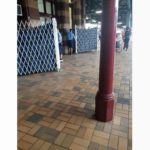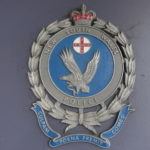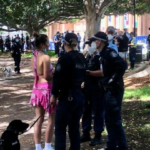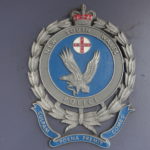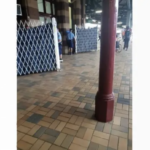Armed NSW Police Officers Shouldn’t Be Ordering Your Kids to Strip Off
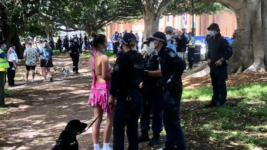
The NSW Police Force strip searched 1,546 children, 10- to 17-year-olds, over the seven years to June 2023, the Redfern Legal Centre revealed last week.
This averages out to 220 kids annually being made to strip naked in front of two adult strangers armed with guns and wearing intimidating blue uniforms.
It’s been documented that some of these youths were abused. And most, if not all, will remember the incident for the rest of their lives.
“The effects of these searches are lasting, leading to trauma, shame, embarrassment, and a fear of police,” write coauthors of The Need for Reform: Strip Searches of Children by NSW Police report RLC senior solicitor Samantha Lee and solicitor Josh Raj.
Indeed, concerns over strip searches has been growing in line with NSW police use having escalated over the last decade or so. And 2018 figures revealed that over the past four years, 64 percent of strip searchers undertaken hadn’t turned up any illegal items.
So, NSW police officers are traumatising the children of NSW parents using a practice that has an impressive failure rate, and often sees badly trained or badly behaved police officers breaching the rules in this extremely sensitive area.
And unlike former Berejiklian government police minister David Elliot, who once said he’d be happy for his kids to be strip searched by NSW police officers, most parents in NSW don’t find the idea of adult strangers ordering their kids to get their clothes off a comforting thought.
Stranger danger
“Strip searches require children to remove clothing without their consent and to stand naked in front of one or two police officers,” the Redfern Legal Centre solicitors make clear. “The searches occur on the street, within a tent or cubicle, in the back of paddy wagons and at police stations.”
“Over half of all strip searches of children occurred within police stations, 53.29 percent, while the remaining 46.7 percent occurred in public,” they added.
The youngest strip search was conducted on a 10-year-old. Two 11-year-old First Nations boys were strip searched over the period. The youngest girls were 12, with 8 being First Nations girls and one non-Indigenous 12-year-old girl being made to undergo this invasive procedure.
“First Nations children made up almost 45 percent of children strip searched despite being only 6.2 percent of the population aged 10 to 17 in NSW,” the lawyers continue, adding that last financial year saw “an increase of over 50 percent in strip searches of girls from the previous year”.
This strip searching of kids is occurring amongst a general normalisation of the procedure’s use on civilians over the last 20 years. And a 2019 UNSW report on strip searching found that NSW police had escalated its use of strip searches twentyfold in 2018, when compared with 2006.
Lee and Raj assert that the practice of strip searching children infringes upon their “fundamental human rights, as they involve depriving the child of their liberty and requiring them to remove their clothing and expose their intimate body parts to an adult police officer”.
Akin to sexual assault by the state
UNSW’s Dr Michael Grewcock and Dr Viki Sentas point out in the 2019 report that the purpose of strip searches is to “avert emergencies or imminent risks of serious harm”, and that it’s supposed to be a measure of “last resort” and “exceptional circumstances”, not routine and to be expected.
But when Lee pointed out in early 2019 that NSW police had placed screens on platforms at Central Station in order to be able to conduct strip searches upon commuters indicated by drug dogs, it became quite clear that the authorities consider the constituency ought to find this normal.
However, the UNSW academics add that because of their commonplace application in nonurgent circumstances unlawful use of the procedure is widespread, and there are many accounts of their illegal use in breaching protocols in more disturbing ways in police watchdog and media accounts.
The rules relating to strip searches are set out in part four division four of the Law Enforcement (Powers and Responsibilities) Act 2002 (NSW), which cites stipulations including those relating to urgency, privacy, same-sex measures and further requirements on how officers must act.
But there have long been complaints that measures not set out in the Act are being applied by officers, which involve ordering strip search subjects to lift testicles, part buttock cheeks, lift breasts, turn their body to face in a different direction and to squat and cough.
And as it turned out, when NSW police briefly released its personal search manual in 2019, it specifically noted all these non-legislated measures are sanctioned in the field, according to management.
Stripping kids at festivals
A key site of youths being strip searched in an illegal manner en masse are music festivals. This is well known to cause teenagers to take more drugs than usual to avoid police detecting their illicit substances and this then, at times, has led to overdosing and death.
Police oversight body the Law Enforcement Conduct Commission’s Inquiry into NSW Police Force Strip Search Practices 2020 report was notorious for having gone too far in terms of what state law enforcement would have appreciated.
Within the LECC report, as well as within related inquiries and hearings, the stories told involve the sort of inappropriate overreach that might be expected when a bunch of armed officers are set loose on a festival-load of teenagers, who are still minors, and encourages the strip searching of them.
“The only specific safeguard for children within the Act is that a child under ten cannot be strip searched,” the new RLC report reads, and it also points out, that a further requirement is “that a support person accompany a child during a strip search”.
“But police can bypass this requirement if police suspect on reasonable grounds that delaying the search will result in evidence being concealed or destroyed, if an immediate search is necessary to protect the safety of a person or if it is not reasonably practicable to obtain a support person.”
The whole thing is a bit off
“The young people RLC supports characterise strip searches as acts of punishment and intimidation,” the RLC strip searching children report further states, and let’s face it, that’s the way strip searches can only be taken when they’re notorious for having served no policing purpose at search end.
The lawyers add that the youths that RLC does speak to report NSW police officers as often displaying “aggression and hostility from the outset of the search and do not believe them when they assert, they do not possess any drugs”.
So, on the street you’re actually guilty until proven nakedly innocent.
RLC has long called for the laws to be changed, and it’s now recommending reforms specifically relating to strip searching and children, which includes NSW police immediately stopping its strip searching of kids, until the laws and the police manual are updated to reflect this prohibition.
Further 10- to 17-year-olds should only be strip searched after arrest and charging or by order of a court.
Police should make a record of why a kid was strip searched, noting the child protection ground reason for the search having taken place, and an independent nonpolice-nonstate adult should always be present.
“RLC has advocated for change in the law and practices related to strip searches in NSW for almost a decade,” the report authors said in summing up.
“In that time, hundreds of children have continued to be subjected to the invasive and often traumatic procedure.”
“Significant change is needed,” the lawyers added. “RLC is calling for an immediate change to NSW law and police policy to ensure better protections for children.”



